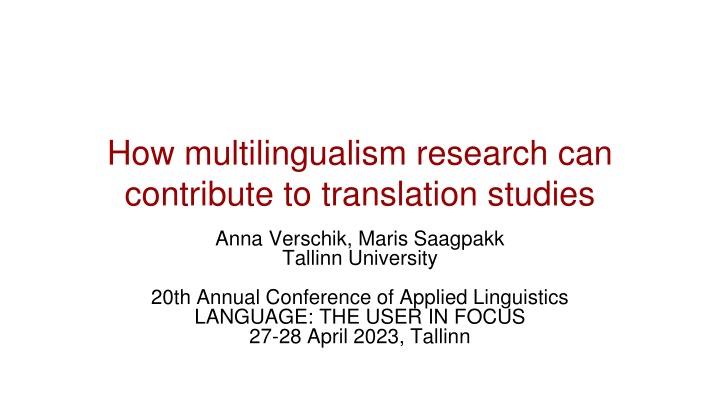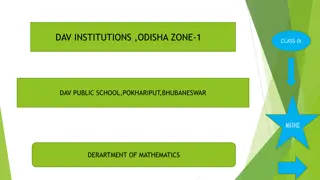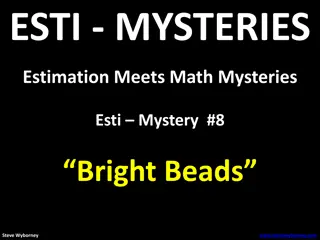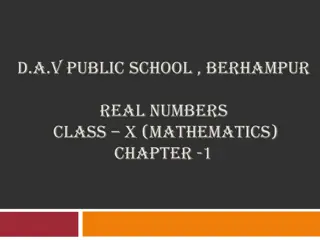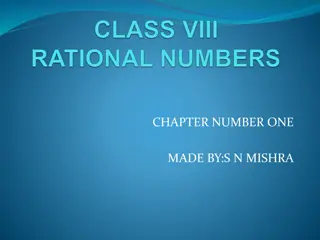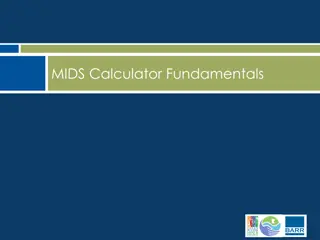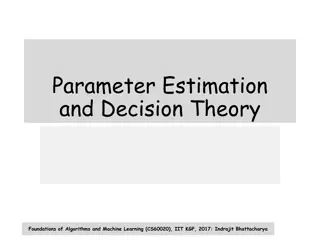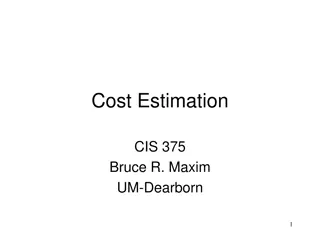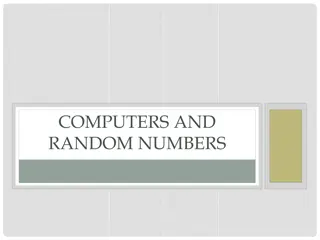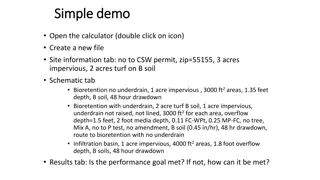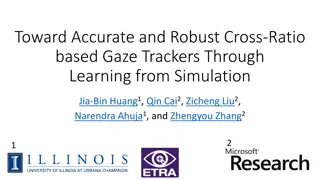Year 6 Calculator Session: Numbers, Estimation & Calculations
The Year 6 Calculator Challenge Lesson focuses on familiarizing students with the calculator, understanding number arrangements, rounding decimals, estimating sums, and completing calculations creatively. The activities encourage critical thinking, problem-solving, and collaborative learning. Students explore various operations, practice estimation, and fine-tune their calculation skills. They engage in fun exercises like turning 0.1134 upside-down to form words and finding number pairs that multiply to 1134. This interactive session enhances mathematical proficiency while promoting teamwork and creativity.
Download Presentation

Please find below an Image/Link to download the presentation.
The content on the website is provided AS IS for your information and personal use only. It may not be sold, licensed, or shared on other websites without obtaining consent from the author.If you encounter any issues during the download, it is possible that the publisher has removed the file from their server.
You are allowed to download the files provided on this website for personal or commercial use, subject to the condition that they are used lawfully. All files are the property of their respective owners.
The content on the website is provided AS IS for your information and personal use only. It may not be sold, licensed, or shared on other websites without obtaining consent from the author.
E N D
Presentation Transcript
How multilingualism research can contribute to translation studies Anna Verschik, Maris Saagpakk Tallinn University 20th Annual Conference of Applied Linguistics LANGUAGE: THE USER IN FOCUS 27-28 April 2023, Tallinn
Outline Multilingualism at the crossroads of sociolinguistics, literature studies, translation studies Towards a descriptive model Multilingualism in literary texts Multilingualism in translations Open questions
Do we need different terms for the same phenomena? Some literary/translation scholars believe we do: Grutman 2005: 18-19 "Heterolingualism": "Before asking ourselves what exactly happens to foreign languages (and language varieties) in translation, it might be useful to briefly reflect upon their literary use, a phenomenon I have labelled heterolingualism in order to avoid unnecessary confusion with real-life situations stemming from language contact, such as societal bilingualism or diglossia. This point cannot be stressed enough, for I do not share the emphasis sometimes placed upon mimetic qualities of multilingualism. Those qualities do not, in my opinion, exhaust the wide array of possibilities offered by juxtaposing or mixing languages in literature."
We answer differently Literature is a fictional reflection of and a play with naturalistic language use. The depiction of language contacts is not a mere mirroring of language use in a society but is nevertheless based on the same linguistic phenomena that exist in real life. Thus, sociolinguistic and contact linguistics can be of a great help.
Factors influencing multilingualism in literary texts Ultimate causes: social factors (status, ideologies, hierarchies) Societal level Proximate causes: communicative factors (goals, linguistic background of the speaker, topic) Individual level Decisions in the process of writing Choice/ filter: similarity, structural and typological features et. Mechanisms: synchronic (code-switching, borrowing); diachronic (conventionalisation of changes) Literary text - object of analysis Backus & Verschik 2008. Attractiveness: Empirical and Theoretical Perspectives.
Multilingualism in fiction Multilingualism in fiction Lorem Ipsum Text Narration Metalinguistc information Non-lexical elements Homogenization Lexical elements Comments on language use (in general) Code-switching (insertion, alteration, congruent lexicalization) Loan translations Influence of the SL in structure, grammar Comments on language use of characters Spelling / phonology
Examples of metalinguistic information - comments on languages Auch Madeleine, der Boris die Geschichte von der B renjagd bersetzt hatte, bewunderte ihn geb hrend. (Vegesack 1957: 58) Even Madeleine, for whom the story of the bear hunt was translated by Boris, found him amazing. in welcher Sprache, w te sie gar nicht mehr (Schaper 1941: 572) in which language, she did not know any more Ich nicht kann geben die Uhr , sagte er ruhig in gebrochenem Russisch (Schultz 1934: 39) I cannot give the watch, he said calmly in broken Russian
Examples code-switching so hatten wir recht ein magus jutt . (Schultz 1934: 145) so we had a rather (in German) sweet talk (in Estonian) Die Fl gelt r ffnete sich, ein umfangreiches, rotbackiges M dchen mit wei er Sch rze bat auf Lettisch zu Tisch: Lud spe gald! (Vegesack 1965: 65) The door opened and a round, red-cheeked girl in a white apron invited in Latvian to the table people to the table (correct Latvian would be l dzu pie galda ).
Non-lexical impact - pronunciation, grammar Steif is er so nicht, sagte Herr Adamson, Stadtsknechte haben ihm erst heute morgen in alte Pulverkeller kefunden, auf ein Strick aufkehongen; ich werde ihm in obere Saal bringen, da is mehr W rmde. [ ] . (Schultz 1934: 28) Ich nicht kann geben die Uhr (Schultz 1934: 39) I not can give the watch [I cannot give the watch]
Backus & Verschik 2008. Attractiveness: Empirical and Theoretical Perspectives. Multilingualism in translation Societal level (ultimate causes) Societal level (ultimate causes) Individual level (proximate causes) Individual level (proximate causes) Decisions in the process of translating Decisions in the process of writing Literary text - object of translation Literary text in translation - object of study
Strategies for translating multilingualism Lawrence Venuti (1991, 1995, 1998) - domestication and foreignisation. Delabastita (1993: 5-6) distinguishes between three levels of codes (linguistic, cultural and text codes) and, on the other hand, transformation categories. substitution, repetition, deletion, addition permutation (Delabastita 1993: 33-34).
Deletion & repetition Ich nicht kann geben die Uhr , sagte er ruhig in gebrochenem Russisch und zeigte die H nde hin, donnez vous la peine, monsieur, de la prendre vous- m me! (39) I not can give the watch , he said calmly in broken Russian and showed his hands: donnez vous la peine, monsieur, de la prendre vous-m me! Ma ei saa kella anda , tles ta rahulikult oma vigases vene keeles ja n itas k ed ette. Donnez vous la peine, monsieur, de la prendre vous-m me! (38) I cannot give the watch , he said calmly in broken Russian and showed his hands: Donnez vous la peine, monsieur, de la prendre vous-m me!
Deletion [ ] wollen wir zusammen singen Mu Isamaa, mu en, mu r mm (allm rkus: Estnisches Volkslied: Mein Heimatland, mein Gl ck, meine Freude (Hueck-Dehio 1955: 380) Should we sing together Mu Isamaa, mu en, mu r mm (Footnote: Estonian folk song: My fatherland, my happiness, my joy . [ ] laulame koos Mu isamaa, mu nn, mu r m (HD (Toompere) 2001: 293-294) [we] sing together Mu isamaa, mu nn, mu r m . (Correct spelling of Estonian).
Addition Ich [ ] sagte: Plihs, gud m d of P rs, u r ise u vor Dschohns Tsch rtsch? Dies liest sich zwar gr lich, ist aber gutes Englisch (SB 1934: 161) I said: Plihs, gud m d of P rs, u r ise u vor Dschohns Tsch rtsch? . This reads itself horribly but it is good English. [ ] tlesin: Plihs, gud m d of P rs, u r ise u vor Dschohns Tsch rtsch? Seda lugedes on ju kole, kuid arusaadavuse seisukohalt on see suuline k ne saksap rases lest henduses hea inglise keel. (SB (Vene 2004: 181) [I] said: Plihs, gud m d of P rs, u r ise u vor Dschohns Tsch rtsch? It reads horribly, but as for comprehension it is oral speech in German transcription good English.
Summary - open questions So far only linguistic level in Delabastita s typology was considered Text level - not individual sentences but the work as a whole Is it possible to work out whether a translator had a systematic strategy (text level) or not (linguistic level)? Cultural level - a systematic analysis is needed; treatment of multilingualism is a part of translation culture as such.
